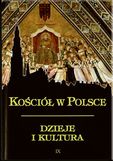Bracia Mniejsi wpisani w historię Chełma (XVIII – XX w.)
Friars Minor Positioned in the History of Chełm (18th – 20th century)
Author(s): Anzelm SzteinkeSubject(s): History
Published by: Katolicki Uniwersytet Lubelski Jana Pawła II - Wydział Teologii
Keywords: History of Franciscans; the ministry of Franciscans; the missionary’s work of Franciscans; patriotic engagements of Franciscans; scietific and cultural activities of Franciscans
Summary/Abstract: On February 28, 1738, the government of the Province of Saint Mary of the Angels of the Friars Minor – Reformists in Małopolska accepted the new foundation of its city's convent under the sub-judge of the territorial court of Chełm, Andrzej Wolski. Father Symforian Arakiełowicz was the prefect of both the construction site for the convent as well as that the adjacent church. The consecration of the church and its handing over to the followers points to the time when construction ended. The consecration of the church and the seven altars took place on the seventh Sunday after the Pentecost (July 19, 1750), and the celebration was presided over by the bishop of Chelm, Mons. Józef Eustachy Szembek. In 1751, the church interior was embellished with the Stations of the Cross; thanks to the generous donations from its benefactors, the following year the Stations of the Cross were also placed on the exterior. From 1746 on, the convent became a part of the new Russian custody of reformists from Saint Mary of Sorrows, which from 1763 was elevated to the level of autonomous province. From that point until its end, the fate of the convent was closely linked to the history of the province. In the year 1800, following the ending of the Russian province, the convent returned once again to be a part of its province of origin. Civil authorities definitively closed the convent as a penalty for the involvement of its followers in the insurrection (1863-64). Throughout its history the convent served as a center of philosophical study. The reformist friars developed their ministry in church, helped nearby parishes, and performed humanitarian work. The friars returned to the city in 1936. From then on (except for the period during the Second World War, 1939-44) they have wholeheartedly dedicated themselves to their work for the local people, for which they are greatly appreciated.
Journal: Kościół w Polsce. Dzieje i kultura
- Issue Year: 2010
- Issue No: 9
- Page Range: 335-352
- Page Count: 18
- Language: Polish

